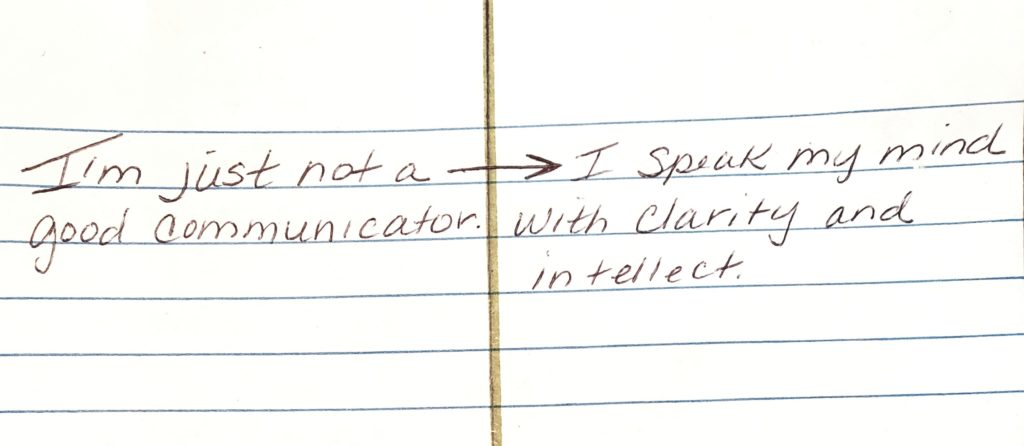Your thinking and how you analyze the world around you has evolved, mostly unconsciously, over your lifetime. Your training and experiences have shaped your worldview and because no two people experience the same life, how you think is distinct to you. This is a good reason not to be judgmental of others; you have not lived the same experiences as they have. Their belief system, and yours, will be unique to personal experience.
The average person has up to 60,000 thoughts per day and according to research conducted by the National Science Foundation, 80% of those thoughts could be negative and 95% repetitive. Most people don’t monitor their thoughts in an effort to improved them. If we are not diligent with our thinking, thoughts can easily run amuck, especially when they are habitual. It’s hard to stop a snowball rolling downhill and when you continue to think those habitually negative thoughts long enough, they become a belief.
In order to break the cycle of the negative monkey mind, you must be diligent with identifying those thoughts. You need to basically stalk yourself. Pay attention to the thoughts you think and begin to question the origin, i.e., “where did that thought come from?” Ask yourself if your beliefs are justified and valid. Keep a journal. I have a friend whose father has always been very consistent about telling her how stupid she is. As she began to accept it, the thought became part of her subconscious mind. It soon grew to become a belief, a very harmful belief that is absolutely not true. So every time she tells herself how stupid she is, she needs to correct herself saying something like, “that untrue thought came from my dad. I am smart about many things.” So keep in mind that the negative thoughts you think might not have originated from you but from someone else that has influenced you, and the sooner that you replace those thoughts with a positive thought, the better.
Although thoughts, as well as the stalking of thoughts, can be painful. The practice can teach you a great many things about yourself and those around you. Growth requires self-examination. “Even though you may not actually like the feelings of inner disturbance that may come from asking key questions, you must be able to sit quietly with yourself and face them if you want to see where they come from. Once you can face your disturbances, you will realize that there may be a layer of pain seated deep in the core of your heart. This pain is so uncomfortable, so challenging, and so destructive to the individual self, that your entire life has been spent trying to avoid it. Your entire personality is built upon ways of being, thinking, acting, and believing that were developed to avoid pain. Real growth takes place when you finally decide to deal with the pain.” From The Tethered Soul by Michael A. Singer.
Exercise: Bounce technique
When experiencing a negative thought, bounce it away with a positive thought instead. Simply replace the thought with a better feeling thought. Draw a line down the center of a tablet or piece of paper, creating two columns. When you catch yourself having a negative thought, write it in the left column. Then draw an arrow leading to the right column and re-write the statement in a positive version. This will assist you in shifting your thoughts. Whenever you catch yourself in the left column, replace the thought with the right column. For example:

Words are a byproduct of our thoughts, and words, in themselves, hold a great deal of power. Pay attention to the words you use and how you use them. Never allow yourself to speak unkindly to yourself or about yourself. You may think Self-deprecation to be funny, but is it really? In reality, it’s a way of reprimanding yourself by belittling, undervaluing, or disparaging your identity. Doing so does not honor you. As they say, to thine own self be true. There is nothing in this world that can trouble you as much as your own thoughts. To be in joy, you need to accept yourself in a loving manner. Choose your words carefully and not just when speaking about yourself, but also when speaking about others. It could be said that we receive in return that which we choose to put out into the world, so choose your words and thoughts wisely.
Even so, the seas of life will surely rock your boat at times, but you can choose your response to the storms. You are not the bad feelings nor thoughts that you get in your head. You are not the storms you walk through. You are the person experiencing the storm. The storm may knock you off your feet, but you are strong. You will rise again. Either the weather will change, you will find shelter, or you will look the storm in the eye with resilience and fortitude, because you know that storm cannot hold you back indefinitely. When you can keep a healthy perspective, your wrath exceeds that of any storm, so be mindful of your thoughts and choose wisely.
“No thought lives in your head rent-free. Each thought you have will either be an investment or a cost.” ~ T. Harv Eker


